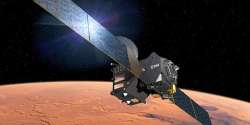Europe's new Mars Orbiter sends first data from NASA rovers Opportunity and Curiosity
In an indication of the strengthening international telecommunications network supporting Mars exploration, the first data from NASA rovers Opportunity and Curiosity reached Earth last week in a successful first relay test of a NASA

In an indication of the strengthening international telecommunications network supporting Mars exploration, the first data from NASA rovers Opportunity and Curiosity reached Earth last week in a successful first relay test of a NASA radio aboard Europe's new Trace Gas Orbiter (TGO).
According to the US space agency NASA, the transmissions from the two active NASA rovers on Mars received by one of the twin Electra radios on the orbiter.
The orbiter's main radio for communications with Earth subsequently relayed onward to Earth the data received by Electra.
"The arrival of ESA's Trace Gas Orbiter at Mars, with its NASA-provided Electra relay payload on board, represents a significant step forward in our Mars relay capabilities," said Chad Edwards from NASA's Jet Propulsion Laboratory, Pasadena, California.
The European Space Agency's (ESA's) ExoMars/Trace Gas Orbiter reached Mars on October 19, 2016.
"We now have a truly international Mars relay network that will greatly increase the amount of data that future Mars landers and rovers can return from the surface of the Red Planet," Edwards said.
NASA is on an ambitious journey to Mars that will include sending humans to the Red Planet. Current and future robotic spacecraft are leading the way and will prepare an infrastructure in advance for human missions.
The JPL-designed Electra radios include special features for relaying data from a rover or stationary lander to an orbiter passing overhead.
Relay of information from Mars-surface craft to Mars orbiters, then from the Mars orbiters to Earth, enables receiving much more data from the surface missions than would be possible with a direct-to-Earth radio link from the rovers or landers, NASA said.